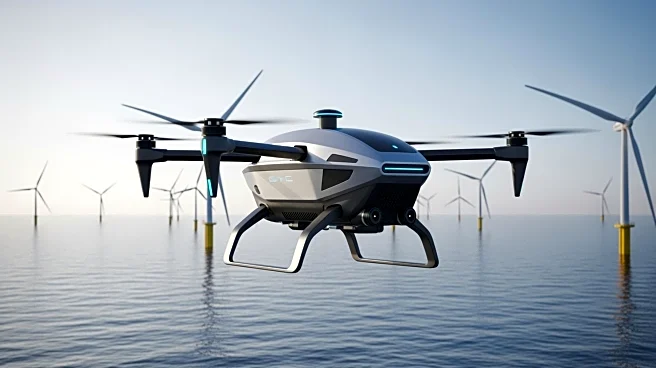What's Happening?
Skyways has successfully demonstrated the capabilities of its long-range autonomous unmanned cargo aircraft by completing a series of Beyond the Visual Line of Sight (BVLOS) deliveries to the Arkona Offshore
Windfarm. This windfarm, operated by RWE and located off the coast of Germany, was the site of a three-week pilot operation in partnership with RWE and Skyports Drone Services. The Skyways V2 aircraft conducted automated 50-mile round trips from RWE’s seaside base to the windfarm in the Baltic Sea, carrying payloads of up to 22 pounds and handling winds up to 29.7 knots. The flights involved precise cargo drops directly to the wind turbines, offering a new logistical tool for operators. This operation demonstrated that essential cargo can be delivered to remote offshore locations faster, safer, and more sustainably than traditional methods, which typically rely on crew transfer vessels requiring two hours for the same journey.
Why It's Important?
The successful demonstration of Skyways' autonomous cargo drone technology represents a significant advancement in logistics for remote and offshore locations. By reducing delivery times from two hours to just 26 minutes, this technology offers a more efficient and sustainable solution compared to traditional methods. The ability to deliver time-critical parts, medical supplies, or urgent cargo in hard-to-reach environments could revolutionize logistics for industries such as energy, healthcare, and emergency response. This development also highlights the growing role of autonomous systems in enhancing operational efficiency and reducing environmental impact, potentially influencing future policies and investments in unmanned aerial systems.
What's Next?
Skyways is now focused on scaling production of its aircraft to meet growing demand from commercial and government customers worldwide. The company plans to expand its operations and continue developing its next-generation V3 aircraft, which is expected to have a range of over 1,000 miles. As the technology proves its reliability and efficiency, it is likely to attract interest from various sectors looking to improve logistics in challenging environments. Stakeholders such as offshore operators, logistics companies, and government agencies may explore partnerships or investments to integrate this technology into their operations.
Beyond the Headlines
The deployment of autonomous cargo drones in offshore windfarms could have broader implications for the renewable energy sector. By streamlining logistics and reducing reliance on traditional transport methods, these drones could lower operational costs and enhance the sustainability of wind energy projects. Additionally, the success of such technology may encourage further innovation in autonomous systems, potentially leading to new applications in other industries and contributing to the advancement of smart infrastructure solutions.









